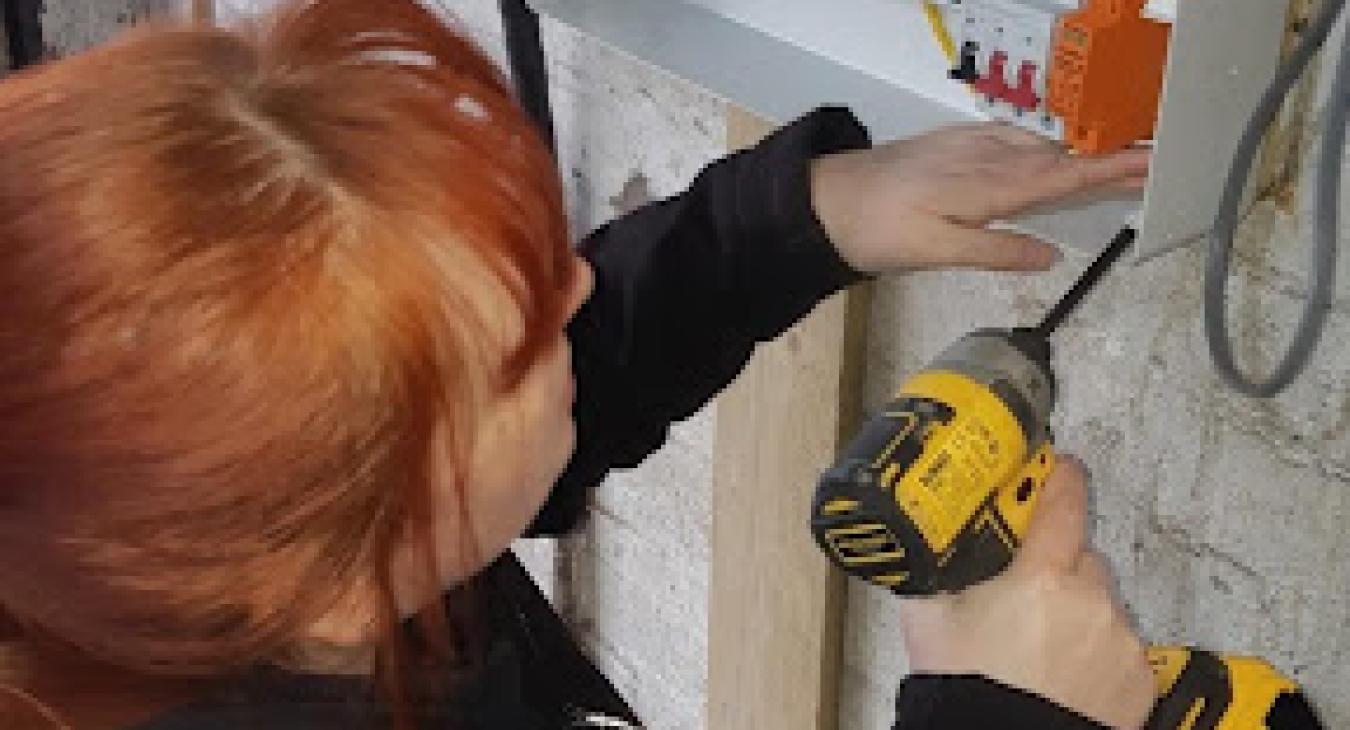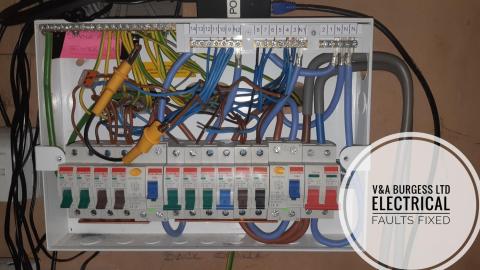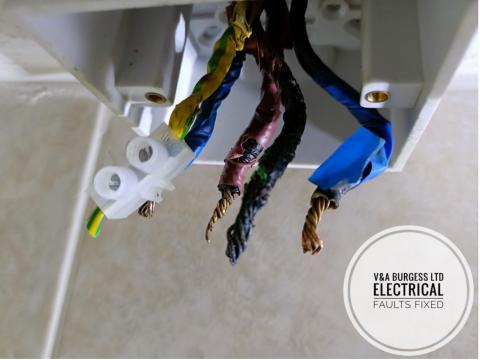
Table of Contents
- Rewiring a house is about the largest electrical job that you could expect to have carried out and will take several days for smaller properties to a couple of weeks for very large properties.
- Things that speed the process up🔜
- Things that slow the process down🔙
- What are typical timescales?
- What are average timescales?🗓️
- What kinds of issues are common to find on a rewire?
- Why is rewiring a home necessary?⚡
- How often do homes need rewiring?
- Why do cables fail?🤔
- What fails first, the consumer unit or cables?
- Cables on the other hand...
- How long will it take to complete my rewire?
- How much does it cost?💷
1) Rewiring a house is about the largest electrical job that you could expect to have carried out and will take several days for smaller properties to a couple of weeks for very large properties.
The length of time taken to rewire a house does depend on several factors which will lengthen or shorten the time taken to complete the work. When asking HOW LONG DOES IT TAKE TO REWIRE A HOUSE, we need to consider the following:
Back to top2) Things that speed the process up🔜
- More electricians mean a quicker rewire – If the company you are using have several electricians available to them then the project will be completed more quickly.
- Less furniture, belongings, and obstacles – The less furniture and belongings that there are then the less there is to cover up, move and protect in order to run cables through the property. The clearer things are the quicker the rewire can be carried out.
- Moving out or going on holiday – If the electricians do not have to work around people, then the process is much quicker. There is no need to restore power at the end of each day and the job can be carried out in a more logical order.
3) Things that slow the process down🔙
- Larger homes – Require more circuits, a bigger fuse box / consumer unit and longer cable runs can lengthen the process as this takes more time to lift more of the floor covering and pull the extra length of the cables through.
- More sockets and switches and lights – These have to be chased (cut into the fabric of the building) into walls, require extra cable and time installing the back boxes and electrical accessories. The more electrical points that are to be installed, the longer the rewire will take
- A customer wanting alterations – Changing your mind part way through a project will not only add to the cost but will add to the time taken to complete the project.
- Coming across building problems during the rewire – When completing home repairs or renovations it is common to find pre-existing problems that will require attention such as damage to floor timbers, loose plasterwork, and other issues. These will require other trades to come and quote for repairs and will possibly add to the time required to rewire the property.
4) What are typical timescales?
Two electricians rewiring a 2-bed terraced property that is empty of people, belongings and stripped to floorboards, could usually complete the rewire in a few days assuming there were no other issues that were found that required other trades intervention. A specialist rewire team rewiring a large occupied 5-bedroom detached home could take several days to a week to complete the work having to restore power each evening before leaving and taking time to move furniture and belongings.
Back to top5) What are average timescales?🗓️
On average a home rewire takes between 3 and 11 days.
- A 2-bedroom house can take between 3 and 5 days to rewire
- A 3-bedroom house can take between 4 and 6 days to rewire
- A 4-bedroom house can take between 5 and 8 days to rewire
- A 5-bedroom house can take between 6 and 11 days to rewire
- A Flat can take 3 to 6 days depending on size to rewire
- A Bungalow can take 3 to 6 days to rewire
6) What kinds of issues are common to find on a rewire?
When undertaking any sort of building work that disturbs the fabric of the building it is not uncommon to discover other works that need to be carried out. When removing floorboards, we occasionally find that joists have been cut so as to present a danger to the structure of the house which then may require a builder to come and strengthen the floor. Wood worm, damp, mould, and asbestos can all introduce a danger to those living in the property and those working on the property and should be investigated and rectified before works are finished. Loose plasterwork is a very common issue in older homes. In modern homes, plasterboard is often used to cover wall timbers whereas in older homes it was common to use lathe and plaster finishes. These older finished have been in place for many decades and the plasterwork has often detached from the wall leaving large slabs of unsecured plasterwork.
7) Why is rewiring a home necessary?⚡
Cables and electrical equipment forming the electrical system in our homes has a limited lifespan. There are many wiring systems in homes across the world that are continuing to function but yet have been in operation for many decades. When cabling and electrical accessories begin to deteriorate, the insulation around the cabling can degrade meaning potential electrical danger and shorting out of cables. When electrical accessories being to fail, they can begin to arc, spark, and overheat as high internal resistances cause issue with electricity flowing properly.
An older fuse box will not provide the protection of a modern consumer unit and will lack many of the modern safety features that are now required under the safety wiring regulations. Older fuse boxes such as rewireable fuse wire type boxes are now many decades old and have served out their useful lifespan. Continued use of these boxes could pose a danger unless they are regularly checked by an electrician. Once old electrical systems reach the point of breakdown there is often no time to wait, no temporary fix that can be carried out and no safe way to repair them. It is in these cases that an immediate rewire becomes necessary. It is sensible to have your homes electrical system checked by an electrician regularly to establish its condition and obtain an idea of how soon a rewire might be necessary.
8) How often do homes need rewiring?
HOW LONG DOES IT TAKE TO REWIRE A HOUSE and how long does the rewire last once it’s done? Modern copper electrical cabling has a manufacturer’s warranty of up to 10 years. The likelihood of cable breaking down within this time period, when it has been correctly installed is absolutely minimal. The manufacturer would never warranty a product for 10 years if they expected it to last 5 years!Generally, a wiring system is expected to give several decades of service before needing rewiring. The question of rewire frequency vastly depends on the following:
- If the wiring system has been heavily used or abused – In these cases the wiring system will likely last less time than that of a lightly used system. The more people in the home and more appliances that are used, the more frequently the need to rewire will arise.
- How many circuits there are – The more circuits there are in general, the less stress there is on individual circuits and the less likely the cabling is to become stressed, overheated, or damaged.
- Additions or alterations – Wiring systems can suffer when extended or altered incorrectly using poor workmanship or materials. A professional and trusted electrician should be used to carry out works on wiring systems
- The quality of the original installation – This includes the workmanship used to carry out the installation and the quality of the materials. The absolute cheapest quote for a rewire is likely to involve a rush job and cheaper materials in order to get the job done for maximum profit. This is not the recipe for a long lasting rewire.
9) Why do cables fail?🤔
Trip switches start to go off and cause problems when the consumer unit senses a problem. When there are unwanted connections between wires tripping can occur. Inside a cable there are three wires generally. These are commonly known as LIVE, NEUTRAL and EARTH. Each of these wires are protected by a coloured insulating material covering the copper. This insulation breaks down over time, this is accelerated by heating and cooling such as when there is a high electrical demand on the cable.
When the cable insulation breaks down the insulation develops micro cracks and electrical current leakage can occur (yes really!), this missing current is often detected by modern consumer units / fuse boxes and they will begin to trip. Cables can fail when they are installed in the wrong environment such as damp, cold or excessively warm areas. Any mechanical damage to cables such as loft boarding placed over the top can result in internal cable insulation failure as well. ☹ We can see from the photograph that the cables here have been extended and the cable connections have failed. The issue is that the older cables were aluminium, a material which has not been used for a long time in most electrical installations. Poor connections are another cause of cable failure.
Back to top10) What fails first, the consumer unit or cables?
Generally, the modern consumer unit will tend to fail before the cabling does and this is the case for modern consumer units rather than older fuse boxes. The reasons for this are:
- Modern consumer units have many more moving and operating parts than older ‘fuse wire’ type boxes. This means that in the event of an electrical anomaly, the consumer unit is likely to react, turn off circuits and dispose of large unwanted electrical fault currents. This puts stress on the switches and operating parts in the consumer unit and they are likely to fail earlier.
- Loose connections inside the consumer unit can see switches and connections burn out creating the need for a total consumer unit replacement in many cases.
- Devices that are not tested by an electrician regularly can ‘seize up’ and require replacement.
- Sacrificial devices such as Surge Protection Devices can need replacing in modern consumer units whereas older fuse boxes did not have these installed.
Generally, as there are many moving parts and intricate devices containing electronics in modern consumer units, it is likely that this ‘brains’ of the electrical system will reach failure, obsoletion or the need for replacement to stay up to date with the wiring regulations far sooner than the cables in the electrical system.
Back to top11) Cables on the other hand...
The cables, if correctly selected, installed, not overloaded and of good quality should outlast two or even three consumer units in some cases. We attend many different homes and find cabling of all ages dating back 60 or 70 years that is still in service. Normally customers are asking us to add on to older systems which is not possible without bringing the installation up to date or even rewiring the property. But nevertheless, the cabling is still installed and functioning.
Back to top12) How long will it take to complete my rewire?
When considering HOW LONG DOES IT TAKE TO REWIRE A HOUSE for a good estimate of the time needed you will have to consider your electrical needs. When considering your rewire, add up how many sockets that are required, how many light switches, light fittings, downlights, cooker circuits, shower circuits, high powered appliances requiring supply, garage supply, shed supply, data / internet supplies for modern equipment and so on. Once you have established exactly how many electrical and data points you need along with any television points and alarm requirements then you will be able to ask for quotes and timescales from electricians. It is important not to try to avoid costs by cutting the number of plug sockets you think you need as this may lead to overloading issues in the future.
Back to top13) How much does it cost?💷
The cost of a rewire will vary with the size of property and your requirements. Typical costs* for a home rewire are as follows:
- A 2-bedroom house can cost between £5000 and £6000 to rewire
- A 3-bedroom house can cost between £6000 and £7500 to rewire
- A 4-bedroom house can cost between £7000 and £9000 to rewire
- A 5-bedroom house can cost between £8000 and £10500 to rewire
- A Flat can cost between £4500 and £7000 to rewire depending upon size
- A Bungalow can cost between £6000 and £10000 to rewire depending upon size
(*At time of writing, typical costs 2023)
📞 01925 595 980 (Warrington)
📞 0151 351 4011 (Liverpool)
📧 Enquire online
💻 Visit our website
Back to top









